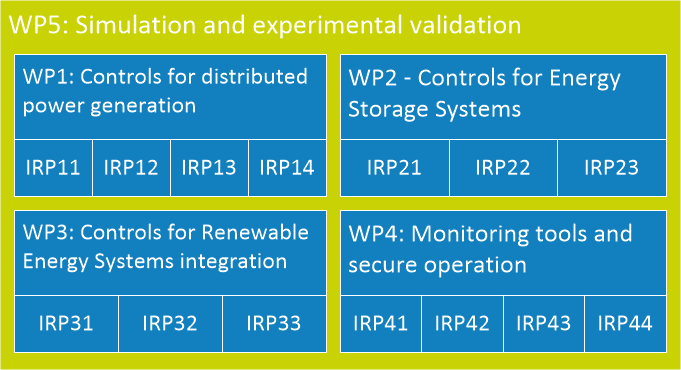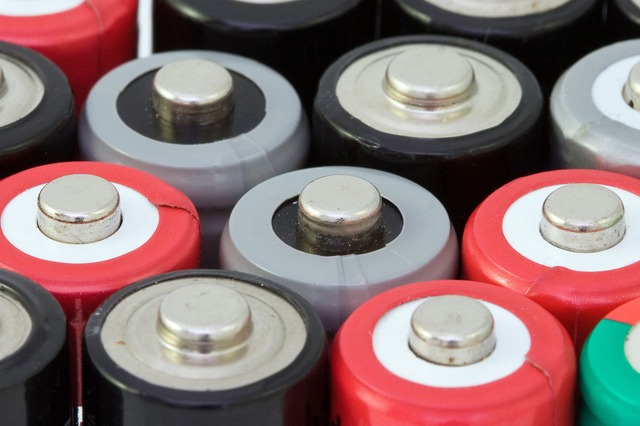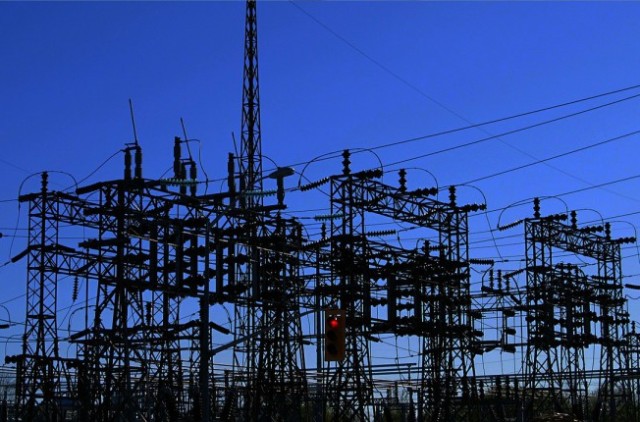INCITE aims to propose innovative solutions for the challenging work of controlling and designing the future electrical networks. For this purpose, INCITE seeks to create a multidisciplinary research space with a complete view of the smart grids control covering:
- Management of distributed electrical generation and consumptions
- Energy storage systems
- Integration of renewable energy into electrical grids
- Monitoring and operation of smart grids
The main purpose is to expose the Early Stage Researchers to the major problems, theoretical and practical, involved in the control of smart grids.
The research programme is organised in four work packages (WP) according to the purpose of the control strategies divided into several Individual Research Projects (IRPs) carried out by one Early Stage Researchers with the guidance of Supervisor researchers. The additional WP5 aims to ensure that the proposed control strategies consider the complex interrelation among the objectives and specifications.

WP1 Control strategies for distributed power generation
The aim is to propose control strategies for optimising the use of distributed generation from renewable energy systems (RES). This covers the view of smart grids as self-sufficient communities (mini- or micro-grids) capable of operating independently from large distribution systems. Concepts of distributed control and large-scale systems are used to deal with the large number of agents and complexity of the grids. The research in this WP employs a more abstract view of electrical networks, focussed on steering the power flow acting on the agents with different approaches ranging from set-point signals to economic policies.

IRP11: Partitioning and optimisation-based non-centralised control of dynamical energy grids

IRP12: Decentralised control for RES by fast market-based MAS

IRP13: Hybrid agent-based optimisation model for self-scheduling generators in a market environment

IRP14: Development of non-intrusive and intrusive energy-management algorithms

WP2 Control strategies for energy storage systems
Energy storage systems (ESS) play a central role in smart grids as they provide the necessary flexibility to compensate temporal imbalances between power supply and demand. ESS contribute at several levels. In the distributed generation view, they are useful to maximise the energy harvesting in RES and compensate their variability. ESS also allow reducing overall energy cost. They improve efficiency by storing energy during high productions intervals and retrieve it during low generation periods. From the integration view, ESS permit to smooth the power injected into the grid and improve the power quality. This is especially important in grids with high participation of RES where the fluctuating power delivered to the grid may cause serious problems. The research tasks in WP2 cover different levels ranging from low-level control such as control strategies for the electronics interfaces to high-level control such as strategies to deal with the high variability of RES.

WP3 Control strategies for RES integration
The increase of RES (mostly wind and solar energy) in the participation of electricity generation may affect the stability of the voltage and frequency in power systems. With participations close to 20% in some European countries, grid codes are starting to impose strong requirements for the integration of RES. In this context, wind and solar plants are required to shift the objective of harvesting as much energy as possible to provide grid support services. The research activities in WP3 centre on new control strategies for RES integration considering electrical aspects such as the stability of electrical variables (e.g. frequency and voltage). The contribution of these tasks employs a less abstract view and closer to the electrical aspects of smart grids.

WP4 Monitoring tools and secure operation of smart grids
Smart grids depend heavily on communications, and delays and interactions may affect the behaviour of the control algorithms. The capability of self-healing is thus important in smart grids in order to adapt the control strategies to ensure a proper behaviour under faults. Smart grids allow a high degree of interaction between producers and consumers, but this depends on the number of metering devices included in the grid. The research activities in WP4 address these aspects close to the implementation and crucial to the proper operation of future smart grids.

WP5 Simulation and experimental validation
The aim of WP5 is to ensure all results produced in the other four WPs take into account the complex interactions of the different parts in the smart grid. As WP1-4 are mainly focussed on some part of the control of smart grid, the objective of WP5 is to ensure continuous feedback and interactions among WP1-4. Indeed, not all control tools analysed in the first WPs can be designed without the inputs from other WPs. Control aimed to an efficient power balance cannot ignore the electrical consideration addressed in WP3 and the ESS analysed in WP2. In similar way, the implementation aspects considered in WP4 cannot be ignored in the other WPs. The main tasks in WP5 are to select a set of benchmark grid models in order to have proper contexts and test cases for the validation of the control solutions produced in WP1-4.











